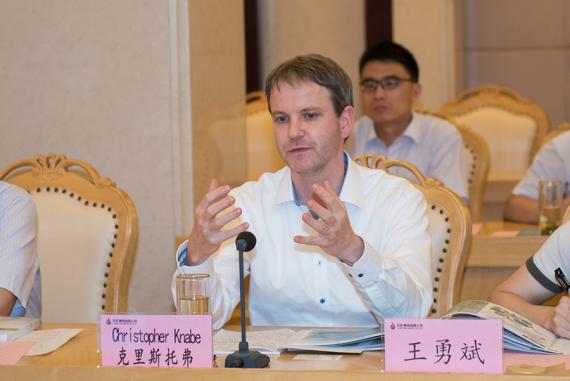Mr. Knabe attend expert meeting of Green Heart Project in Jining
On May 24th, 2019, specially invited by Yankuang Group and Tongji Planning Institute, Mr. Christopher Knabe, Vice President of Obermeyer China, as an expert, participated in the “Yankuang Group Coal Mine Subsidence Area Ecological Restoration Project -- Conceptual Planning of the Green Heart Project in Jining Metropolitan Area" expert review meeting.
As one of the largest design and engineering consulting companies in Germany, Obermeyer has extensive experiences in ecological restoration. At the expert meeting, Mr. Knabe put forward the following five suggestions for the conceptual plan:
1. China is currently in the initial stage of urbanization, and more people will enter the city in the future. The conceptual planning of the project, as a pre-planning, should fully consider the development requirements of the next 20 or even 50 years. The base should fully consider what kind of highlights industries will attract the migrants to live in, and whether the site's infrastructure planning can meet the growing needs of the future.
2. In China, as a pioneering concept, the ecological restoration of coal mine subsidence areas should be carried out at a higher level and at a higher perspective. It is recommended to use the site as a pioneering and experimental area for ecological restoration of coal mine subsidence areas in the 1st step, in order to re-link this region in a ‘image of the region’ but also physically to ecological restoration.
3. Ecology and economy are inseparable. In Germany, ecology is the economy, and the economy is the ecology. The two constitute the two forms in the cycle and share the core principle ‘eco’. A good ecology produces a good economy, and a good economy can feedback and help build a good ecology. It is recommended to make full use of long-time German planning and design experience with similar already fully implemented projects and to re-establish the cycle of ecological economy in the ecological restoration planning of coal mine subsidence areas, and further promote the economic development of the region in the future.
4. Try to inject technology education industry. In the future, coal mining will no longer rely solely on extensive mining technology, and high-tech coal mine mechanization and processing industries will dominate. These require the constant injection of high-tech technical talents. A training base can be established on the original site to train high-tech coal mine technical talents within the company, and reserve talents for the development of the company in the next 20 or 30 years.
5. Most of the site subsidence areas have been filled with water, and the pollutants in the water should be considered in the future planning and design. The polluted water source needs to be cleaned on site. It cannot be directly flowed into the Sihe River and Baima River in the site. Water quality monitoring points should be established at each water outlet to monitor the water quality in real time.
Mr. Knabe’s suggestions were unanimously recognized by Yankuang Group and Tongji Planning Institute. Obermeyer hopes to provide a helping hand for the conceptual planning of the Jining Metropolitan Green Heart Project in the Yankuang Coal Mine Subsidence Area Ecological Restoration Project.
Background information:
The base is located in the southwestern part of Zoucheng City, Jining, Shandong Province, and is the mining area of Yankuang Group. After nearly 40 years of underground coal mining, the 84.16 square kilometers of coal mining area has less than 20 years of remaining mining, and the ground is sinking, forming different areas of collapse. At the beginning of 2018, in response to the call of the national “Lucid waters and lush mountains are invaluable assets”, Yankuang Group, which is committed to industrial transformation, launched the “Jining Metropolitan Green Heart Project”, invited Shanghai Tongji Urban Planning and Design Institute and Tongji University Environmental Science and Engineering to restore the ecology, design the landscape and plan the industrial planning for the subsidence area.

